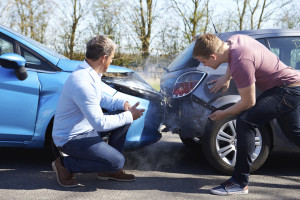<p style="text-align: justify;"><em>Suffered a bad rear end collision? Not sure of the laws and how to seek legal compensation? Help is at hand regardless of who is at fault in a rear end collision.</em></p>
<p style="text-align: justify;">Who is at fault in a rear end collision? The eternal question continues. It has been noted that in most cases in a rear end collision, it is generally the fault of the person who strikes the car in front from the back. The traffic laws unequivocally state that a driver should stop at a safe distance from the car ahead of him or her when it slows down or stops completely. This is regardless of any situation that may have prevailed at the time of the incident.</p>
<p style="text-align: justify;"><img class="aligncenter" src="http://www.foranyinfo.com/wp-content/uploads/2016/05/fort-lauderdale-rear-end-collisions.jpg" alt="Who Is At Fault In A Rear End Collision?" width="720" height="224" /></p>
<p style="text-align: justify;">In some special cases, the striking driver is not considered at fault. For instance, if the vehicle strikes another vehicle from behind after being struck by a third vehicle that causes the collision, the fault remains with the vehicle that caused the primary incident. All cases are different and have to be handled differently.</p>
<h3 style="text-align: justify;"><strong>Decree of California Law on Rear End Collision</strong></h3>
<p style="text-align: justify;">The rule of law in California is based on the comparative negligence system. The law takes into account that a driver can be at fault partially for the accident. The injured victim can claim a certain percentage of damages calculated on the basis of his or her exact involvement in the collision. If you have struck a vehicle in rear ended collision, but the other driver was drunk, or had suddenly swerved into the lane in front of your vehicle, you could be eligible to file a damage claim.</p>
<h3 style="text-align: justify;"><strong>Legal help to Seek Compensation</strong></h3>
<p style="text-align: justify;">If you have been a part of a rear end collision in California and have suffered a serious injury, then, you are advised to seek immediate help from a personal injury attorney. This rings true even if prima facie the accident is your fault. Only an experienced personal injury lawyer can determine whether you can claim compensation or not. The legal counsel would review the details of the case and determine how to proceed with the same.</p>
<p style="text-align: justify;">If the other party’s conduct has contributed to a serious injury, then, you will be eligible to seek economic and non-economic compensation alike. This would entail the following</p>
<ul style="text-align: justify;">
<li>Medical expenses pertaining to the injury suffered.</li>
<li>Loss of income and future earning capacity.</li>
<li>Loss of use for property.</li>
<li>Cost for nursing or domestic services required during the injury period.</li>
<li>Cost of repair or replacement of the vehicle.</li>
<li>Mental, emotional and physical harassment and anguish.</li>
<li>Loss of social companionship.</li>
<li>Loss of reputation.</li>
</ul>
<p style="text-align: justify;">It is a good idea to ask a professional lawyer for help as the non-economical compensation can far exceed the economic compensation.</p>
<h3 style="text-align: justify;"><strong>How to Proceed with the Filing of your Claim</strong></h3>
<p style="text-align: justify;">It is imperative that your first point of contact should be your lawyer. The insurance company evaluator may seem very friendly but is actually working for the insurance company. Any statement that you give can be used if and when the insurance company moves for litigation. It has been seen that recorded statements are often twisted to help the insurance agency turn a good claim into a bad one.</p>
<p style="text-align: justify;">Please do use legal help to assess your losses and formulate your statement once you know who is at fault in a rear end collision. Act fast and within the stipulated time to get best results.</p>

Who Is At Fault In A Rear End Collision?
